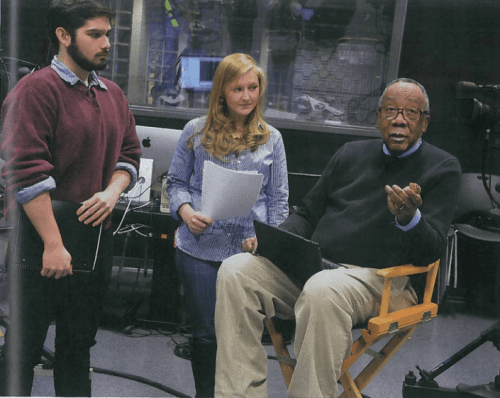
Professor Donald J. Brow with Ryan Mendias ’13 and Sara Epperson, staff members of the Office of Digital Dissemination and Online Education
Fund for Innovation Fuels Online Learning
Yale University’s Eli Magazine, Winter 2014
Last summer, Donald J. Brown, the Philip R. Allen Professor of Economics, taught Yale students in a virtual classroom. The course, Welfare Economics and Equity, was one of several offered through Yale Summer Online, launched in 2012. It was also a chance for Brown to test a shared “digital whiteboard.”
Participants, who only met online, used an iPad-based tool to draw graphs and equations for all to see and edit in real time. This content, along with streaming audio, was recorded for later review. Brown found the tool so effective that he used it last fall in his traditional classroom.
Brown’s experiment is part of a larger push by the university to extend its reach through online technology. Another innovator is the School of Nursing, which now offers an online component for its doctorate of nursing practice for mid-career professionals. The School of Forestry & Environmental Studies is offering one of its executive education certificate programs online – and in Spanish.
In his inaugural address, President Salovey underscored these efforts: “By continuing to harness technology, we can amplify the words of Yale’s great teachers so that our lectures and lessons can enlighten and inspire more people in more places,” he said. “However, the most significant impact on our missions is likely to come from the use of digital resources that can improve teaching and stimulate learning here on campus.”
A faculty-driven initiative
To support broad dissemination of Yale educational materials and new excellence in the classroom, Robert Rosenkranz ’62 and his family foundation recently established the Rosenkranz Fund for Pedagogical Innovation at Yale. The gift enables the provost to direct funding on a competitive basis to faculty in Yale College and the professional schools who use online technology; it also provides support for the Office of Digital Dissemination and Online Education.
“The Rosenkranz Fund comes at a critical time when the interest among Yale faculty is experimenting with online instruction is burgeoning,” said Linda K. Lorimer ’77 J.D.. vice president for global and strategic initiatives. “Once again Robert and his family have made a timely investment in Yale. His newest gift will allow schools as well as individual faculty the means to take their best ideas and translate them into online courses and instructional materials.”
Broad efforts in web-based learning
Lorimer notes that schools are using online, for-credit classes in strategic ways to advance their educational mission. For example, Yale College will offer approximately fifteen courses online for credit this summer, and the university is collaborating with Cornell and Columbia to teach less-frequently taught languages like Zulu. The Yale School of Management has created online courses for its MBA students and for students enrolled in other business schools partnering in the Global Network for Advanced Management.
This semester, Yale is launching its next phase Open Yale Courses with free, not-for-credit offerings that include Financial Markets, by 2013 Nobel Price recipient and Sterling Professor Robert J. Shiller. Other courses can be found at www.Coursera.org/Yale.
Last spring Yale appointed its first academic director of online education – Craig Wright, the Henry L. and Lucy G. Moses Professor of Music – to help shepherd these initiatives.
A champion of arts and education
Robert Rosenkranz is the CEO of Delphi Financial Group; his Rosenkranz Foundation supports the arts, pblic policy, and higher educatio and includes on its board his wife, Alexandra Munroe, and his son, Nicholas Quinn Rosenkranz ’92, ’99 J.D. At the 2009 dedication of Rosenkranz Hall, a building for Yale’s international and political science programs, then-Provost Salovey called Rosenkranz and Munroe “two of Yale’s wisest and most discerning leaders.”
“Online courses have the potential to transform education at both secondary and university levels,” Rosenkranz said. “Ideally, they can leverage the abilities of extraordinary teachers, allow students to proceed at their own pace, and provide instant gratification when material is grasped – as well as helpful feedback when it is not. Yale, with its tradition of excellence in teaching, should play a leading role in this potentially revolutionary development. My family and I are pleased this gift will help Yale to do so.”